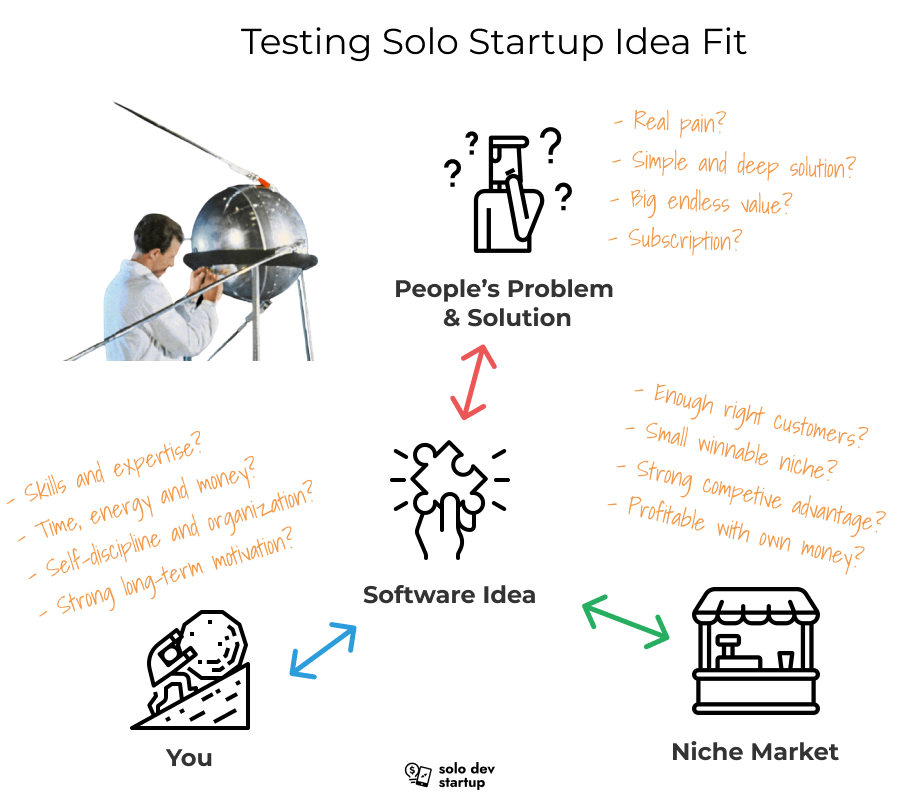
Part 3. Yourself – You have time, money, energy, and expertise to put your startup idea in motion.
Your solo startup will have only one employee – you as a founder – who is a busy entrepreneur, marketer, developer, admin, and support person at the same time. You have to do everything and without you, nothing will happen. Can you do it all even you found a great problem to solve and market for it?
TEST 11. THE STARTUP IDEA SHOULD MATCH YOUR SKILLS AND EXPERTISE

What are you expert in?
There are big bonuses to your idea if you
- Know this problem/business space and love it.
- Understand target customers’ needs, doubts, and desires better than they do.
- A pro in solution technology.
In the beginning, as a solo founder, you will carry the main burden of implementation and support. Many new challenges will compete for your attention. You will not have much time to learn the related technology or the problem space. But you have to be an expert in something to enable your startup’s successful growth.
You don’t need to be an expert in everything.
What you should know well are the main development stack and idea core domain. You can learn the rest on the go.
There are plenty of APIs and integrations that can cover common features:
- databases, web services, and hosting (Azure, AWS, DigitalOcean)
- payments (Stripe, PayPal, Braintree)
- SMS / voice calls (Twilio)
- communication (Intercom, Mailchimp)
- user management (Auth0, Firebase)
- translation, maps (Google, Microsoft)
- collecting information (Typeform, SurveyMonkey)
- AI (Amazon ML, Azure M, Google Auto ML)
- e-commerce (Shopify, Etsy)
- connecting services in the workflow (Zapier)
But these services will not replace expertise to create a great product for your idea. You have to match the idea and put in place a quality solution that grows your startup and makes your customers happy.
TEST 12. YOU SHOULD HAVE TIME, SELF-DISCIPLINE, MOTIVATION, AND ENERGY TO WORK ON YOUR STARTUP IDEA

Burnout, disappointment, and loss of interest are the top reasons why many startups fail.
It is much harder to build a startup if you are a solo-founder, have another job, and have nobody to help and care for. Also, there are many important things in life that could slow you down and divert attention.
Can you discipline and organize yourself to steadily work on the startup alone? Can you be a good and still demanding own boss?
You should be able to manage your life and motivate yourself to work productively long hours. You have to
- Build important parts for technical implementation and business startup growth alone.
- Keep your startup running every day after launch.
- Address challenges coming from complex systems, confused people, and uncertain markets.
- Keep working at your main job if you bootstrap and don’t quit.
- Learn a problem, market, and user needs on the go to turn your side project into a business.
How much time and energy do you have?
Realistic expectations, a healthy lifestyle, and pace are important for solo-founder startup success. You do have the luxury to choose your speed and control your work. But you should have an ultimate commitment to getting your startup idea going.
Limit the idea to the life rhythm that you can sustain in the long run. But still, move fast with the passion for creating a good business.
TEST 13. YOU CAN BUILD A FIRST SOFTWARE VERSION IN A SHORT TIME WITH AVAILABLE MONEY

You should build the first live version for your idea in a couple of months. Software used by real people who pay is a big morale boost and validation of your idea. Before the product launch, you are in the dark.
Don’t work on your idea for too long without feedback!
Any projections, surveys, and hypotheses cannot replace encounters with reality. The only real proof is when people can find you, sign up, use your software, and pay you their own money. This is a true recognition of the value that you provide in solving their problems.
Bootstrap your work and avoid borrowing money.
There is a big chance that your idea will not work and you will return to your previous life. But all debts will remain. Start building software keeping your current income sources and spending only your savings. Even if your idea gains traction, you will still be better off financing yourself. Having full control over your startup as a single founder is a great position. Bootstrapping pushes you to a profitable idea from the beginning.
A good strategy is to start working on the idea as a side project without giving up on your current work. Canny’s founder Sarah Hum followed this path with the side project, Product Pains. She and her friend designed and bootstrapped the project while working at Facebook. Soon enough, their feedback management tool achieved a 100k annual recurring revenue in its first year.
Build a minimum viable product (MVP) version in a couple of months.
Make shortcuts, stitch other services together, and avoid perfection. You can always make it great later if your idea gets traction. Be ready to continue improving your idea continuously after the launch.
Warning: don’t give a bad product to your first users. The quality should be good enough that people like and continue using your software. They can forgive small problems if your software solves their pain. But a bad quality product will make them quit and give it bad reviews.
TEST 14. YOU CAN AUTOMATE YOUR STARTUP AND SEEK HELP IN THE AREAS THAT YOU LACK THE TIME OR SKILLS.

Your time will be the most scarce and precious resource when you work as a solo founder on your startup. Consider all possibilities to free up yourself. Working long hours will sink your productivity, motivation, and creative energy.
Automation and delegation become the two main ways to scale your effort.
Automation – use services (or your own solutions) to do routine tasks:
- marketing communication for visitors,
- social media scheduled posting,
- onboarding email series,
- analytics aggregation and dashboards,
- support bots and feature tours,
- payment receipts and unpaid notices
- software failure monitoring
Delegation – involve short-time professional help, for example
- designers for website and branding,
- system admins for the configuration of hosting,
- copywriters, marketers, and strategists for building online marketing,
- developers for building an isolated component
- a student friend for admin/support help.
You should pay attention if these methods indeed save you time and mental energy. Complex automation or unreliable people can add more problems than solve existing ones. And they cost money and time to set them right.
Consider how to save your time for startup development and everyday operations. Offload brain load, manual work, or one-off tasks that are not easy for you. Free up your time for more creative contributions to your startup’s growth.
TEST 15. YOU SHOULD LOVE AND EMBRACE YOUR STARTUP IDEA, AND IT SHOULD MAKE YOUR LIFE MEANINGFUL

Why is this startup important to you? Do you feel love for what you are going to do for the startup? Why would you sacrifice your life on a risky venture that has high chances of failure? What will keep you going? What is your tolerance for uncertainty and stress?
Do you like to work on the startup at all? Can you commit to activities that take a big chunk of your day with all ups and downs? Is it aligned with your long-term goals, talents, and ideal lifestyle?
Starting as the solo founder is challenging. Nobody will share the load, brainstorm with you, or provide support in everyday work. Are you ready to be strong, decisive, and rely on yourself?
You should answer these questions before the start.
Early answers can help you to avoid disappointment and wasting a lot of time. The money will not come easy and fast to sweeten your initial efforts. You will have doubts, regrets, and even the desire to give up and return to a normal life. But you have to keep going. Do you know why?
The solo-founder startup can be a nightmare or a very rewarding life experience. It all depends on you and your idea.
Do it for people, do it for yourself! Choose the startup idea to make your life interesting, useful, and meaningful!
Summary
A good solo startup idea is
Solution for a people’s problem:
- Addresses real pain
- Simple and small
- Deep and specific
- Brings a big endless value to your customers
- Delivered as a monthly subscription
- Attracts the right users
- Places your startup in a small and focused niche market
- Has a competitive advantage
- Wins niche customer acquisition
- Profitable at a low price
Match for your:
- Skills and expertise
- Availability, motivation, and energy
- Potential to quickly build with your own money
- Ability to automate and delegate
- Long-term life aspirations
Test your solo startup idea fit to increase success (or survival) chances from the start.

What do you do if the idea doesn’t pass the test?
1. Redefine the problem until your idea solves a real specific pain that people are ready to pay for.
Even great software needs users. They will come if your idea promises to solve their pain. They will stay and pay if the idea addresses their core problem and brings continuous value. Alone, you can pull all of this off only if a solution is small, simple, and still deep.
2. Re-position your idea to find a winnable niche market with enough right customers.
The business will grow only if you can get customers and convince them to switch over to your product. Target the right people who are self-serving, pragmatic, and make quick buying decisions. Find a small existing, profitable niche where your idea can become a leader. Position your solution to win a niche with an obvious competitive advantage.
3. Consider changing your idea to match your skills, time, and lifestyle.
The idea requires your energy, motivation, and commitment to succeed. Your time, skills, and money are the main assets of the new startup. Learn more and tame yourself before the journey start if you are not ready. You are the only person who can make your startup grow and make money. Just make sure you can and do it!
Recommended Reading

Leave a Reply